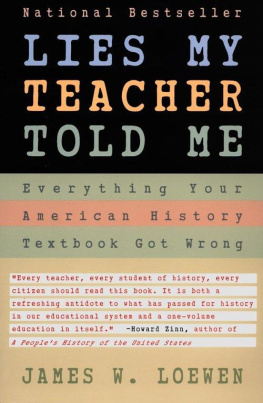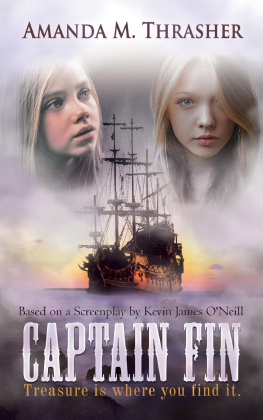Acknowledgments
The people listed below, in alphabetical order, talked with me, commented on chapters, suggested sources, corrected my mistakes, or provided other moral or material aid. I thank them very much. They are: Ken Ames, Charles Arnaude, Stephen Aron, Jose Barreiro, Carol Berkin, Sanford Berman, Robert Bieder, Bill Bigelow, Michael Blakey, James Baker, Linda Brew, Tim Brookes, Josh Brown, Lonnie Bunch, Vernon Burton, Claire Cuddy, Richard N. Current, Pete Daniel, Kevin Dann, Martha Day, Margo Del Vecchio, Susan Dixon, Ariel Dorfman, Mary Dyer, Shirley Engel, Bill Evans, John Fadden, Patrick Ferguson, Paul Finkelman, Frances FitzGerald, William Fitzhugh, John Franklin, Michael Frisch, Mel Gabler, James Gardiner, John Garraty, Elise Guyette, Mary E. Haas, Patrick Hagopian, William Haviland, Gordon Henderson, Richard Hill, Mark Hilgendorf, Mark Hirsch, Dean Hoge, Jo Hoge, Jeanne Houck, Frederick Hoxie, David Hutchinson, Carolyn Jackson, Clifton H. Johnson, Elizabeth Judge, Stuart Kaufman, David Kelley, Roger Kennedy, Paul Kleppner, J. Morgan Kousser, Gary Kulik, Jill Laramie, Ken Lawrence, Mary Lehman, Steve Lewin, Caret Livermore, Lucy Loewen, Nick Loewen, Barbara M. Loste, Mark Lytle, John Marciano, J. Dan Marshall, Juan Mauro, Edith Mayo, James McPherson, Dennis Meadows, Donella Meadows, Dennis Medina, Betty Meggars, Milton Meltzer, Deborah Menkart, Donna Morgenstern, Nanepashemet, Janet Noble, Jeff Nygaard, Jim O'Brien, Roger Norland, Wardell Payne, Mark Pendergrast, Larry Pizer, Bernice Reagan, Ellen Reeves, Joe Reidy Roy Rozensweig, Harry Rubenstein, Faith Davis Ruffins, John Salter, John Anthony Scott, Saul Schniderman, Barry Schwartz, Louis Segal, Ruth Selig, Betty Sharpe, Brian Sherman, David Shiman, Beatrice Siegel, Barabara Clark Smith, Luther Spoehr, Jerold Starr, Mark Stoler, Bill Sturtevant, Lonn Taylor, Linda Tucker, Harriet Tyson, Ivan von Sertima, Herman Viola, Virgil J. Vogel, Debbie Warner, Barbara Woods, Nancy Wright, and John Yewell.
Three institutions helped materially. The Smithsonian Institution awarded me two senior postdoctoral fellowships. Members of its staff provided lively intellectual stimulation, as did my fellow fellows at the National Museum of American History. Interns at the Smithsonian from the University of Michigan, Johns Hopkins, and especially Portland State University chased down errant facts. Second, the flexible University of Vermont allowed me to go on leave to work on this book, including a sabbatical leave in 1993. Finally, The New Press, Andre Schiffrin, and especially my editor, Diane Wachtell, provided consistent encouragement and intelligent criticism.
It would be better not to know so many things than to know so many things that are not so.
Felix Okoye American history is longer, larger, more various, more beautiful, and more terrible than anything anyone has ever said about It.
James Baldwin Concealment of the historical truth is a crime against the people.
Gen. Petro G. Grigorenko, samizdat letter to a historyjournal, c. 1975, USSR Those who don't remember the past are condemned to repeat the eleventh grade. James W. Loewen
Lies My Teacher Told Me
Introduction: Something Has Gone Very Wrong
High school students hate history. When they list their favorite subjects, history invariably comes in last. Students consider history the most irrelevant of twenty-one subjects commonly taught in high school. Bor-r-rtng is the adjective they apply to it. When students can, they avoid it, even though most students get higher grades in history than in math, science, or English. Even when they are forced to take classes in history, they repress what they learn, so every year or two another study decries what our seventeen-year-olds don't know.
African American, Native American, and Latino students view history with a special dislike. They also learn history especially poorly. Students of color do only slightly worse than white students in mathematics. If you'll pardon my grammar, non-white students do more worse in English and most worse in history. Something intriguing is going on here: surely history is not more difficult for minorities than trigonometry or Faulkner. Students don't even know they are alienated, only that they don't like social studies or aren't any good at history. In college, most students of color give history departments a wide berth.
Many history teachers perceive the low morale in their classrooms. If they have a lot of time, light domestic responsibilities, sufficient resources, and a flexible principal, some teachers respond by abandoning the overstuffed textbooks and reinventing their American history courses. All too many teachers grow disheartened and settle for less. At least dimly aware that their students are not requiting their own love of history, these teachers withdraw some of their energy from their courses. Gradually they end up going through the motions, staying ahead of their students in the textbooks, covering only material that will appear on the next test.
College teachers in most disciplines are happy when their students have had significant exposure to the subject before college. Not teachers in history. History professors in college routinely put down high school history courses. A colleague of mine calls his survey of American history Iconoclasm I and II, because he sees his job as disabusing his charges of what they learned in high school. In no other field does this happen. Mathematics professors, for instance, know that non-Euclidean geometry is rarely taught in high school, but they don't assume that Euclidean geometry wasmistaught.Professors of English literature don't presume that Romeo andJuliet was misunderstood in high school. Indeed, history is the only field in which the more courses students take, the stupider they become.
Perhaps I do not need to convince you that American history is important. More than any other topic, it is about us. Whether one deems our present society wondrous or awful or both, history reveals how we arrived at this point. Understanding our past is central to our ability to understand ourselves and the world around us. We need to know our history, and according to C. Wright Mills, we know we da.
Outside of school, Americans show great interest in history. Historical novels, whether by Gore Vidal (Lincoln, Burr, et al.) or Dana Fuller Ross (Idaho!, Utah!, Nebraska!, Oregon!, Missouri.', and on! and on!) often become bestsellers. The National Museum of American History is one of the three big draws of the Smithsonian Institution. The series The Civil War attracted new audiences to public television. Movies based on historical incidents or themes are a continuing source of fascination, from Birth ofa Nation through Gone with the Wind to Dances with Wolves andJFK.
Our situation is this: American history is full of fantastic and important stories. These stories have the power to spellbind audiences, even audiences of difficult seventh-graders. These same stories show what America has been about and are directly relevant to our present society. American audiences, even young ones, need and want to know about their national past. Yet they sleep through the classes that present it.
What has gone wrong?
We begin to get a handle on this question by noting that the teaching of history, more than any other discipline, is dominated by textbooks. And students are right: the books are boring. The stories that history textbooks tell are predictable; every problem has already been solved or is about to be solved. Textbooks exclude conflict or real suspense. They leave out anything that might reflect badly upon our national character. When they try for drama, they achieve only melodrama, because readers know that everything will turn out fine in the end. Despite setbacks, the United States overcame these challenges, in the words of one textbook. Most authors of history textbooks don't even try for melodrama. Instead, they write in a tone that if heard aloud might be described as mumbling lecturer." No wonder students lose interest.








